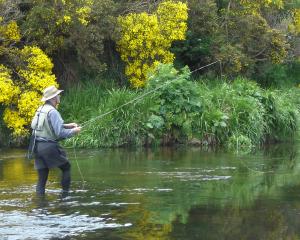Angling prospects look good for this weekend, with no rain on the horizon like last week.
Although the weather has been cooler this week, too cool for cicada fishing, it is generally a good thing as when the water gets too warm trout slow up as the oxygen levels in the water drop.
Many small streams are very low, but some such as the Waipahi can still fish well.
I drove over the Waipahi this week and saw a fish rising steadily, but I had bigger fish to fry that day. When small streams are low fish will be found in or close to deep pools and beneath overhanging trees. They may venture into the ripples at the head of the pool at dusk but retreat to deeper water during the day.
A hatch of mayflies or sedges may tempt them to the surface throughout the day. Rises beneath the willows almost guarantee that they are feeding on willow grub.
Fishing a sedge in the evening is worthwhile, but fishing in small streams once darkness descends can be difficult unless you know the water well.
Bigger rivers are better to fish in the evening as one pool can be enough to fish, which eliminates stumbling from pool to pool.
Also fish a strong tippet so fish can be played out quickly without the risk of a break-off.
The Mataura is looking good for the weekend as it is dropping steadily; so too is the Taieri throughout its length.
Salmon fishers will be hoping recent high water will have brought some salmon into the Waitaki.
I fished the Pomahaka midweek, which had dropped to a fishable level after last weekend’s rain. Although I did notice on the website that it was rising a little at Leithen Glen and hoped I would not have too much of an effect where I was fishing lower down the river.
There was little action when I started, so I watched an area where I have often seen fish rise and after a few minutes there was a rise under an overhanging willow.
A few minutes later it rose again — time to have a go.
I was casting to my limit to reach it but as soon as the nymph hit the water the line pulled away and I struck, but too late. Soon after, another fish rose a short distance upstream. This time I connected with it, but it thrashed on the surface and dropped off.
Not a propitious start to the day.
It was a while before I saw another rise. This time it was in open water in a line of current defined by the leaves drifting down it, having been blown from the willows by a gusty wind.
The hardest part of the operation was to get into position without spooking the fish.
I suspect the floating leaves gave me cover.
One cast and a nice fish was hooked and landed.
In the early afternoon the river started to rise and all activity stopped.



